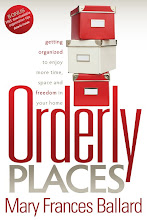January--Paper, Files, Home Office
February--Books and Hobbies
March--Attics, Clothing
April--Linens and Bathrooms
May--Garage and Yard
June--Children's Rooms, Guest Room/Spare Room
July--Family Room or Den
August--Toys, Electronics (are they the same thing?!)
September--Bedrooms, Clothing
October--Dining Room
November--Pantry, Kitchen
December--Holiday
Now on to January. It is time to deal with the papers and other items in home offices. Regardless of the size or space you have to manage the running of the home, you need a clutter free space to pay bills, keep records and manage accounts. The computer was supposed to make us a paper free socieity but we all know that did not happen. We bought printers and made matters worse. Here are a few tips to help with this areas.
- Create an inbox for incoming papers: mail, bulletins, newsletters, schedules, etc. Put this in the space you normally drop mail. Select categories and put the paper that enters the house in the correct section. If you use a compact hanging file box, make a hanging folder for each category that fits your situation. Drop the papers in it and deal with them when necessary or the file is full. I continually get feedback from clients on how this one thing helped them to get control of incoming bills, etc.
- Save only legal documents or papers related to your home or health in a permanent file drawer or box. You do not need to keep the statements from every institution after they have been checked for accuracy and/or paid. Those accounts are kept in computer files by the institution that you can access if necessary. Even appliance and electronic manuals are kept online now.
- Purchase a fireproof/waterproof box for storing originals of legal documents and information that relates to your accounts, etc. This will be heavy but can be locked and withstands destructive elements in case of disaster. It can also be accessed by you when banks with safety deposit boxes are closed.
- Shred old documents with personal information and recycle the rest. Minimize your paper storage.
- Stop magazine subscriptions and get your information at the library or online. Move out all older magazines. If you have read them, you don't need them. If you have not read them by now, you won't read them in the future. The same goes for newspapers. Except for the Sunday edition with coupons (if you are a couponer), most news and obituaries (of course) can be found online. Remember magazines and newspapers are more than half advertisements.
- Throw away catalogues as soon as they come in. Save the discount label if you decide to order something online or by phone. Looking through catalogues is like watching a very long commercial. What a waste of time!
- Speaking of time: Use a calendar with a week at a glance that breaks the days into house. Smartphones and computers have free calendar programs like this or you can use a paper version. Block out your activities and you will see the available hour you have to do the things you have put off.
- Clear the desk, counter, table or whatever you use for office activities every night before going to bed.
- If you would like more information on guidelines for saving papers, I have a document I will send to you. Email me through my website: www.OrderlyPlaces.com and let me know you want it. My book also has more detail on organizing your papers, files and office. It is in your local library and can be purchased online from Amazon or my website.

